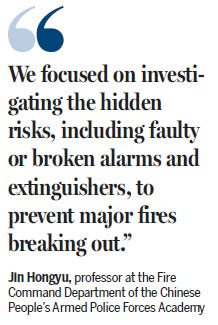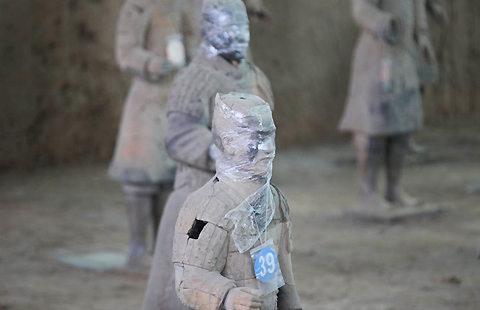
Experts say a lack of professionalism and poor training are hampering China's fire departments, and putting lives at risk, report Zhang Yan and Wang Xiaodong.
Even after 15 years as a firefighter, Dai Yaqiang still has to muster all his courage every time he enters a burning building.
"Honestly, when we arrive at a scene, no one really wants to go into the fire," the 33-year-old said. "No one knows the exact site of the fire in the building, or how many flammable items are inside, and no one can predict how the fire will behave from one moment to the next."
|
Firefighters carry the body of a dead colleague on a stretcher after a warehouse fire in the northeastern city of Harbin in Heilongjiang province in January. Five firefighters died fighting the blaze and 14 people were injured. Xiao Jingbiao / For China Daily |
|
Firefighters combat a fire on a bus during a drill in Chongqing, Southwest China. Liu Chan / Xinhua |
Dai, head of the Shuangyushu Brigade of the Beijing Fire Department, has attended more incidents than he can remember. He said many of the fires posed no threat to life, and some had even been extinguished before he and his colleagues arrived. However, other calls required careful calculation and monitoring as firefighters searched through the smoke-filled, darkened rooms, constantly aware of the possibility of a roof or wall collapse.
Last year, Dai's 60-strong team attended about 1,400 incidents in the Haidian district of Beijing. In recent years a large number of fires across the country have not only resulted in a high casualty count and huge loss of property, but also attracted widespread attention from the media and public at home and overseas.
Part of the problem lies in the fact that in China firefighters are recruited from army conscripts, who receive a limited amount of basic training before being sent to a brigade to sink or swim.
In 2013, there were 388,000 fires in China, more than double the previous year, and the death toll was 2,113. The number of casualties also doubled compared with 2012, according to figures released by the Ministry of Public Security.
Fifteen firefighters died in the line of duty in 2014, as brigades around the country attended more than 1.2 million fires and/or rescue operations, according to statistics released by the ministry.
On Feb 5, a deadly blaze at an 11-story wholesale market in Huizhou, Guangdong province, resulted in 17 deaths, according to Xinhua News Agency. The blaze, which was thought to have been started accidentally by a 9-year-old boy playing with a cigarette lighter, quickly spread to the whole floor. Four firefighters were injured in the operation to rescue five people, according to the report.
According to the ministry, most fires in residential buildings and commercial spaces are caused by smoking in prohibited places, poorly installed or maintained electrical wiring, or the misuse of electrical implements that results in overloaded circuits.
Dai echoed that view: "In most cases, fires are caused by violations of regulations and a lack of preventive awareness. They can usually be prevented."
By contrast, blazes at locations such as warehouses and storage facilities are far more difficult to tackle and pose a greater risk to life because the buildings often contain large amounts of flammable material and the floor plans are complex, so they are full of unexpected dangers, he said.
Urbanization imbalance
"The acceleration of the urbanization process has exposed fire hazards across the country," said Du Wenfeng, a professor at the Fire Engineering Department of the Chinese People's Armed Police Forces Academy in Hebei province.
According to Du, the imbalance of urbanization means that although many cities now boast high-rises, they also have a huge number of low-level buildings and narrow, winding streets that hamper access for firefighters and their equipment.
"Sometimes, a lack of space and poor access means the equipment can't be immediately transported to the scene of an incident, while low ceilings and cramped interiors prevent firefighters from using the equipment when it actually arrives," he said. "In burning buildings, the priority is to evacuate the residents and rescue anyone that has become trapped."
The optimum time to tackle a blaze is within 30 minutes of it breaking out, so obstacles can lead to delays and increase the dangers to firefighters.

"The fire and dense smoke in burning buildings may result in firefighters losing their bearings and inadvertently suffering injury, by falling down a flight of stairs, for example," Du said, adding that buildings collapse after being on fire for a long period, which poses an even greater threat to those tackling blazes.
On Jan 2, an eight-hour fire in Harbin, Heilongjiang province, caused an 11-story building to collapse without warning, killing five firefighters of ages 18 to 22. Access to the building had been blocked by a number of obstacles and led to delays in help arriving.
Initial investigations suggested that the fire had been caused by the unauthorized use of a large number of high-capacity heaters that overloaded the local grid, according to media reports.
"It's so difficult to predict when a collapse will occur, so people shouldn't blame the onsite commanders," said Jin Hongyu, a professor at the Fire Command Department of the Chinese People's Armed Police Forces Academy.
He urged the establishment of a national fire-emergency mechanism, and said all senior commanders should be well trained, fully aware of modern firefighting methods, and have long practical experience, especially in emergency drills, to improve efficiency and reduce the number of casualties.
Greater awareness required
To tackle these issues, the Ministry of Public Security recently conducted a thorough investigation into fire hazards in key areas.
The risk of fire increases during periods such as Spring Festival, when billions of yuan are spent on fireworks, and large numbers of people gather in public places for celebrations, traditional ceremonies, shopping and entertainment, according to Yang Jianming, the political commissar at the ministry's fire control bureau.
"We focused on investigating the hidden risks, including faulty or broken alarms and extinguishers, to prevent major fires breaking out. We also looked at ways to improve evacuation techniques in key places such as shopping malls, entertainment venues, restaurants and tall buildings," he said.
The ministry will also improve and update training for firefighters, while ensuring that local public security departments, communities and volunteers organize evacuation drills for residents so they will learn how to protect themselves if a fire starts, he said.
Li Yinqing, a researcher at the China Academy of Building Research, called for a wider range of early stage preventive measures. "Fire prevention should be considered when cities and buildings are being planned. Urban construction and fire safety need to develop together."
When high-rise buildings are under construction, the interior design should include a number of "asylum rooms" constructed from inflammable materials, powerful ventilation systems and dedicated pipelines to allow water to be carried to any part of a building in the event of fire, he said.
The authorities are also aiming to slash the number of incidents and injuries by improving education to raise public awareness of fire prevention and teach people how to escape from burning buildings, he added.
Dai, of the Shuangyushu Brigade, said that in recent years many urban residents have improved their awareness, and some have even helped firefighters to extinguish blazes.
"We have discovered that many young people are actually quite professional in terms of fire prevention and control," he said. "We hope a larger number of people will undertake training programs, and that companies will carry out regular fire drills to eliminate risks. Ultimately, we would like to see businesses and individuals assume greater responsibility to ensure that fewer fires start."
Contact the writers at zhangyan1@chinadaily.com.cnand wangxiaodong@chinadaily.com.cn
(China Daily 02/25/2015 page6)








